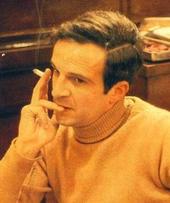François Roland Truffaut (French IPA: [t?y'fo]) (February 6, 1932 – October 21, 1984) was one of the founders of the French "New Wave" in filmmaking, and remains an icon of the French film industry. In a film career lasting just over a quarter of a century, he fulfilled the functions of screenwriter, director, producer or actor in over twenty-five films.
Life
Truffaut was born out of wedlock in Paris, where he was raised by his mother and his adoptive father, Roland Truffaut, both of whom were devout Catholics. He never met his biological father Roland Lévy, a Jewish dentist. Truffaut had a difficult childhood that resulted in rebellion against his parents in particular and authority in general. Truffaut reported that his film The 400 Blows (1959) was largely autobiographical. His love of films partly came from his elective father, the writer and critic André Bazin.Truffaut came to filmmaking only after an early career as one of the most outspoken film critics in France, writing for Bazin's Cahiers du cinéma (of which he became an editor in 1953). Cahiers at this time was intensely critical of post-war French cinema which it saw as overtly literary at the time. As a result of the severity of his critiques, Truffaut was refused a press pass to the 1958 Cannes film festival.Along with his Cahiers colleagues, including Jean-Luc Godard and Éric Rohmer, Truffaut was enamoured with Hollywood filmmakers such as Alfred Hitchcock, Nicholas Ray and Howard Hawks, then often dismissed as mere genre film makers. In a 1954 article Truffaut expounded the politique des auteurs, or Auteur theory of cinema, which championed the idea that movies should reflect the personal vision and preoccupations of the director.On October 29, 1957, he married Madeleine Morgenstern at the city hall in Paris. The couple had two children, Laura (b. January 22, 1959) and Eva (b. June 29, 1961). His father-in-law, a film producer and distributor, helped to get Truffaut's career off the ground by financing the making of his first film, the short Les Mistons (1958). He and Morgenstern divorced in 1965. In 1983, he had a daughter with actress and constant companion, Fanny Ardant, Joséphine Truffaut, who was born on September 28, 1983, a year before his death.The dynamics of relationships are a common thread throughout most of his films.Truffaut was an expert on Sir Alfred Hitchcock, even publishing the book Le Cinéma selon Alfred Hitchcock (1962, also known as Hitchcock/Truffaut) which recorded interviews and conversations with Hitchcock. His last film Confidentially Yours, a comedy thriller in black and white, could be considered to be a "fake Hitchcock".Truffaut's 1973 production of La Nuit américaine (known under the English title Day for Night) won the Academy Award for Best Foreign Language Film.Truffaut sometimes appeared as an actor in his own films, and appeared in Steven Spielberg's Close Encounters of the Third Kind.Truffaut suffered from a brain tumour which was diagnosed in 1983. He died shortly thereafter in the American Hospital in Neuilly-sur-Seine at the age of 52. He was buried in the Montmartre Cemetery in Paris.
Work
Among Truffaut's films one can discern a series featuring the character Antoine Doinel, played by the actor Jean-Pierre Léaud who began his career in The 400 Blows at the age of fourteen, continuing as the favourite actor and "double" of Truffaut himself. The series would continue with Antoine and Colette (a short film in the anthology Love at Twenty), Stolen Kisses, Bed & Board and finally Love on the RunIn most of these movies, Léaud's partner is Truffaut's favourite actress Claude Jade as his girlfriend (and then wife), "Christine Darbon".A keen reader, Truffaut adapted many literary works:
* American detective novels:
o The Bride Wore Black by William Irish
o Mississippi Mermaid by William Irish
o The Long Saturday Night (filmed as Confidentially Yours) by Charles Williams
o Down There (filmed as Shoot the Piano Player) by David Goodis
o Such a Gorgeous Kid Like Me by Henry Farrell
* Novels by Henri-Pierre Roché:
o Jules et Jim
o Two English Girls
* A science fiction novel:
o Ray Bradbury's Fahrenheit 451
* A short story:
o Henry James' "The Altar of the Dead", filmed as The Green Room, considered by some to be his deepest and most serious filmTruffaut's other films result from original screenplays, often co-written by the screenwriters Suzanne Schiffman or Jean Gruault, films on very diverse subjects, the sombre The Story of Adele H., inspired by the life of the daughter of Victor Hugo, with Isabelle Adjani, or La Nuit américaine (or "The American Night" which is both the English translation and the French version of the cinema technique known as "Day For Night" which is the English title of the film), shot at the Studio La Victorine describing the ups and downs of film-making, or The Last Metro, set during the German occupation of France, a film rewarded by ten César Awards.
